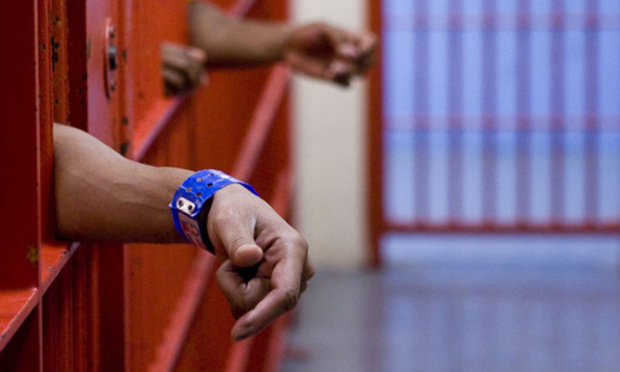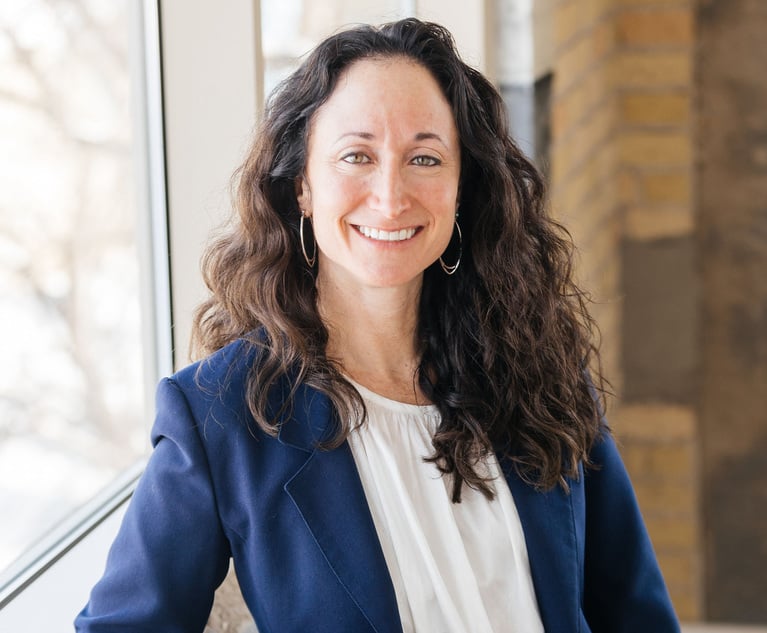Prioritizing Justice by Reforming Treatment of Low-Level Offenses
Courts and prosecutors should not sweat the small stuff—that is, misdemeanors, which are, by definition, "minor wrongdoings."
July 28, 2020 at 11:20 AM
6 minute read
 Photo: Photo: Diego M. Radzinschi/ALM
Photo: Photo: Diego M. Radzinschi/ALM
In recent months, some New York district attorneys' offices and the New York courts have issued statements proclaiming their commitment to equality and anti-racism. They've also expressed their interest in both protecting the safety of the community as the state seeks a careful balance between reopening the court system and protecting the community from risks associated with COVID-19.
If these entities are serious about addressing both of these critical issues, a good place to start would be reimagining the prosecution of low level offenses. With cases backlogged and judges processing a fraction of the cases they used to every day, courts and prosecutors should not sweat the small stuff—that is, misdemeanors, which are, by definition, "minor wrongdoings."
Even prosecutors and courts seem to agree that these cases are not worthy of much attention. Statewide, approximately 44% of misdemeanor cases last year wound up as dismissals. Another 30% of cases ended in non-criminal dispositions, offenses that don't even rise to the level of misdemeanors.
In the city, the numbers are even starker. Most misdemeanor cases are dismissed; only 12.6% wind up as misdemeanor convictions. But these cases are by no means "minor" for people who are charged with them. Even showing up to fight one when we are not in a pandemic means that those who can least afford it must find child care, miss work, and get transportation to court for the months of appearances it takes for a case to wind through the system. These individuals also routinely lose employment because of pending cases, whether or not the cases have merit or become convictions. And for those who are sentenced, even to non-criminal offenses, there are other costs, including court fees and surcharges, which, if not paid timely, can result in incarceration, license suspension, and still more charges.
As has been documented time and again, these harms fall disproportionately on people of color. To be sure, there are bigger fish to fry. People languish in jail as they await jury trials that have yet to resume across the state, and grand juries are only beginning to start in some jurisdictions.
Governor Cuomo has suspended key due process principles. In Nassau County, where my students and I practice in Hofstra Law School's Clinic, the attorney/client privilege has been obliterated as lawyers talk to their clients awaiting arraignment on a speakerphone held by the officers who are detaining them. Most chilling of all, New York's 40,000 inmates are in truly mortal danger, as correctional facilities are the hottest of the COVID-19 hot spots nationwide. People are literally dying, and outside New York City we are still holding on to non-criminal charges against peaceful protesters; fighting about whether we should follow the legal default and seal the criminal record of a person taking a plea to a non-criminal offense (instead of letting it forever besmirch her history for future employers); and requiring a person whose case is being dismissed for lack of evidence to appear before a virtual court (meaning she, her counsel and an interpreter all must travel to and meet inside counsel's office because the client doesn't have the technology or private access to her attorney otherwise).
These are not random examples—they are things that happened to our clinic's very modest caseload in the past week. And it is such matters that are wasting precious resources of defense counsel, prosecutors, court staff and judges, even as court administrators are working overtime trying to get their constitutionally mandated public facilities back up and running safely.
The easiest way to ameliorate the situation would be to filter out cases before they even become cases. Millions of protesters nationwide are urging police and policymakers to demonstrate that black lives matter, in part by reducing over-policing of communities of color. But prosecutors also have the opportunity to turn off the spigot—that is, cases charging people (disproportionately people of color) flowing into the criminal justice system. The police may arrest, but prosecutors may determine, as they did recently in the case of Akbar Rodgers, that justice might be served by using their discretion to dismiss.
More to the point, prosecutors could decide not to prosecute some cases at all. Most of the boroughs' prosecutors, for instance, declined to prosecute non-violent protesters. Last year of the 12,658 cases prosecutors declined to prosecute in New York, fewer than 100 were outside of the city.
Some of the lowest level offenses may present the greatest opportunities for change. In Nassau County, on a pre-COVID day, there could be easily 70 desk appearance ticket (DAT) cases per day. These are cases in which police make an arrest, but then release the person with a notice to appear in court some weeks later. In July, the court began addressing, in person, six of the backlogged cases per day; now they are up to 10. There is no public information about which cases are among the select few in which defendants have been summoned to appear, but they include at least one in which the charge is the noncriminal offense of possession of marijuana, punishable at worst by a $50 fine.
Given the demographics of people charged with these offenses, compelling these individuals to come to a large, public facility often via public transportation, risks exacerbating the racial disparity of COVID infections and deaths. We need to prioritize. We need to recognize the serious negative effect upon people and communities. In New York City, prosecutors and defense counsel are already going through cases on their list of outstanding DATs, seeing which can be dismissed or otherwise disposed of before they even get to court. Long Island should follow suit, with a committee of district attorneys and defense counsel trying to winnow down the backlog.
While this approach might be inspired by the extreme circumstances of the pandemic, counties outside the city would do well to consider the role of prosecutors as a filter, even when we emerge from this crisis. Of course, not every misdemeanor is truly "minor" and worthy of dismissal at the outset, just as not every felony is "serious." But misdemeanors deluge the criminal courts, dwarfing the number of felonies charged each year. Too often even the cases that end in dismissals take months and inflict far too grave a toll on people's lives before they end.
If courts and prosecutors are truly committed to both justice and safety, they will begin to think more critically about whether we really need to criminalize so many people and drag them through the courthouse, which, even in pre-COVID times, meant the process was the punishment.
Elizabeth Nevins is a clinical professor of law at the Maurice A. Deane School of Law at Hofstra University.
This content has been archived. It is available through our partners, LexisNexis® and Bloomberg Law.
To view this content, please continue to their sites.
Not a Lexis Subscriber?
Subscribe Now
Not a Bloomberg Law Subscriber?
Subscribe Now
NOT FOR REPRINT
© 2025 ALM Global, LLC, All Rights Reserved. Request academic re-use from www.copyright.com. All other uses, submit a request to [email protected]. For more information visit Asset & Logo Licensing.
You Might Like
View All
‘Catholic Charities v. Wisconsin Labor and Industry Review Commission’: Another Consequence of 'Hobby Lobby'?
8 minute read
AI and Social Media Fakes: Are You Protecting Your Brand?

Neighboring States Have Either Passed or Proposed Climate Superfund Laws—Is Pennsylvania Next?
7 minute read
Trending Stories
- 1New York-Based Skadden Team Joins White & Case Group in Mexico City for Citigroup Demerger
- 2No Two Wildfires Alike: Lawyers Take Different Legal Strategies in California
- 3Poop-Themed Dog Toy OK as Parody, but Still Tarnished Jack Daniel’s Brand, Court Says
- 4Meet the New President of NY's Association of Trial Court Jurists
- 5Lawyers' Phones Are Ringing: What Should Employers Do If ICE Raids Their Business?
Who Got The Work
J. Brugh Lower of Gibbons has entered an appearance for industrial equipment supplier Devco Corporation in a pending trademark infringement lawsuit. The suit, accusing the defendant of selling knock-off Graco products, was filed Dec. 18 in New Jersey District Court by Rivkin Radler on behalf of Graco Inc. and Graco Minnesota. The case, assigned to U.S. District Judge Zahid N. Quraishi, is 3:24-cv-11294, Graco Inc. et al v. Devco Corporation.
Who Got The Work
Rebecca Maller-Stein and Kent A. Yalowitz of Arnold & Porter Kaye Scholer have entered their appearances for Hanaco Venture Capital and its executives, Lior Prosor and David Frankel, in a pending securities lawsuit. The action, filed on Dec. 24 in New York Southern District Court by Zell, Aron & Co. on behalf of Goldeneye Advisors, accuses the defendants of negligently and fraudulently managing the plaintiff's $1 million investment. The case, assigned to U.S. District Judge Vernon S. Broderick, is 1:24-cv-09918, Goldeneye Advisors, LLC v. Hanaco Venture Capital, Ltd. et al.
Who Got The Work
Attorneys from A&O Shearman has stepped in as defense counsel for Toronto-Dominion Bank and other defendants in a pending securities class action. The suit, filed Dec. 11 in New York Southern District Court by Bleichmar Fonti & Auld, accuses the defendants of concealing the bank's 'pervasive' deficiencies in regards to its compliance with the Bank Secrecy Act and the quality of its anti-money laundering controls. The case, assigned to U.S. District Judge Arun Subramanian, is 1:24-cv-09445, Gonzalez v. The Toronto-Dominion Bank et al.
Who Got The Work
Crown Castle International, a Pennsylvania company providing shared communications infrastructure, has turned to Luke D. Wolf of Gordon Rees Scully Mansukhani to fend off a pending breach-of-contract lawsuit. The court action, filed Nov. 25 in Michigan Eastern District Court by Hooper Hathaway PC on behalf of The Town Residences LLC, accuses Crown Castle of failing to transfer approximately $30,000 in utility payments from T-Mobile in breach of a roof-top lease and assignment agreement. The case, assigned to U.S. District Judge Susan K. Declercq, is 2:24-cv-13131, The Town Residences LLC v. T-Mobile US, Inc. et al.
Who Got The Work
Wilfred P. Coronato and Daniel M. Schwartz of McCarter & English have stepped in as defense counsel to Electrolux Home Products Inc. in a pending product liability lawsuit. The court action, filed Nov. 26 in New York Eastern District Court by Poulos Lopiccolo PC and Nagel Rice LLP on behalf of David Stern, alleges that the defendant's refrigerators’ drawers and shelving repeatedly break and fall apart within months after purchase. The case, assigned to U.S. District Judge Joan M. Azrack, is 2:24-cv-08204, Stern v. Electrolux Home Products, Inc.
Featured Firms
Law Offices of Gary Martin Hays & Associates, P.C.
(470) 294-1674
Law Offices of Mark E. Salomone
(857) 444-6468
Smith & Hassler
(713) 739-1250






